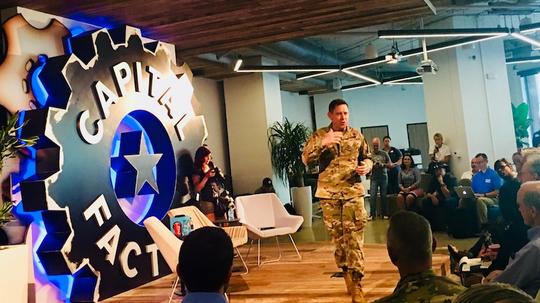
Beginning around 2016, the Department of Defense (DoD) started looking at sources of new technology it had not traditionally explored – startups. And since then, public-private partnerships between military branches and tech startups have been growing.
Riding off the success of its DoD-centric Defense Innovation program that has been building in Austin, Texas-focused incubator and accelerator Capital Factory is expanding that into its locations in Dallas and Houston. The program looks to help startups navigate the numerous departments and contract vehicles the DoD offers, as well as help founders make connections with government leaders and other businesses working in the defense industry.
“If you go back, it used to be that the DoD would decide they want to solve this big technology problem. They would invest a whole bunch of money in it, do proof of concept and all those early-stage research discoveries… they would then turn it into products and technologies,” Kevin Landtroop, VP of defense innovation at Capital Factory, told NTX Inno. “The Defense Innovation Units decided they were going to create a commercial solution to open a way to tap into the products that were already being made and have this contract model that was actually something [startups] can do.”

Capital Factory has been working with the defense industry for a few years and with gaining momentum opened its Center for Defense Innovation in 2019. The center is anchored by the Army Applications Laboratory, with the Air Force and other branches working alongside startups and innovators.
Landtroop said the DoD is looking for companies that have tech that has both commercial and defense capabilities, knowing that VCs (who’s funding the department matches to an extent) are looking of startups that have value in the civilian market. The department looks for companies that already have a technology that can easily be used for a defense solution. He added that one of the benefits of DoD funding is that there is no equity turned over.
“There’s been this evolution of how the DoD is looking to find emerging technologies,” Landtroop said. “Startups are the technology producers that the DoD wants to be able to access. Venture capital is what controls the startups because they do what the VCs are investing in, so we have to make it where the VCs… think it’s a valuable thing.”
Landtroop said he expects public-private partnerships to grow, in part, due to new demands created by the Covid-19 pandemic. In May, the accelerator announced that 31 of its companies received $63 million in DoD funding, spanning nearly every branch and funding vehicle, with investments ranging from $10,000 to $15 million.
Following that announcement, Capital Factory made known its plans to expand the Defense Innovation program, as well as launch a Small Business Innovation Research accelerator. Capital Factory also put out a call for its Human Performance Investment Challenge, which is offering $100,000 to a startup chosen by a panel of entrepreneurs, VCs and defense industry leaders. The deadline to apply for the challenge ends on June 28 and a winner will be chosen at the virtual Fed Supernova conference on July 17.

“We are a Texas ecosystem, we focus on Texas because we know Texas,” Landtroop said. “We did what we do, we created a scalable, repeatable program that helps companies find value in this process. It’s the awareness of what the programs are and what the opportunities are for the companies.”
Capital Factory’s training starts with the Defense Academy, a four-hour boot camp on the basics of how to navigate funding opportunities like SBIR, OTAs, AFWERX challenges, AAL’s Capabilities Accelerator, xTech Search, as well as subcontracts from enterprise companies already operating in the industry.
Landtroop said that when Capital Factory first entered the Dallas market “there was already this bubble of demand… [that] exploded,” and that is what it is hoping to do again with a defense focus. He said the North Texas region is poised for growth due to the number of startups already working in emerging technologies, along with the large enterprise companies like Bell, Lockheed Martin and Raytheon that have experience and need for subcontractors.
“We have to go to Dallas to shine the spotlight so that folks know where to go, and they’re going to get the information, they’re going to make the relationships and they’re going to start writing proposals,” Landtroop said. “There’s tons of opportunity for it to really get to the next level in Dallas. From a defense perspective, Dallas has the potential to be a lot bigger than Austin.”








